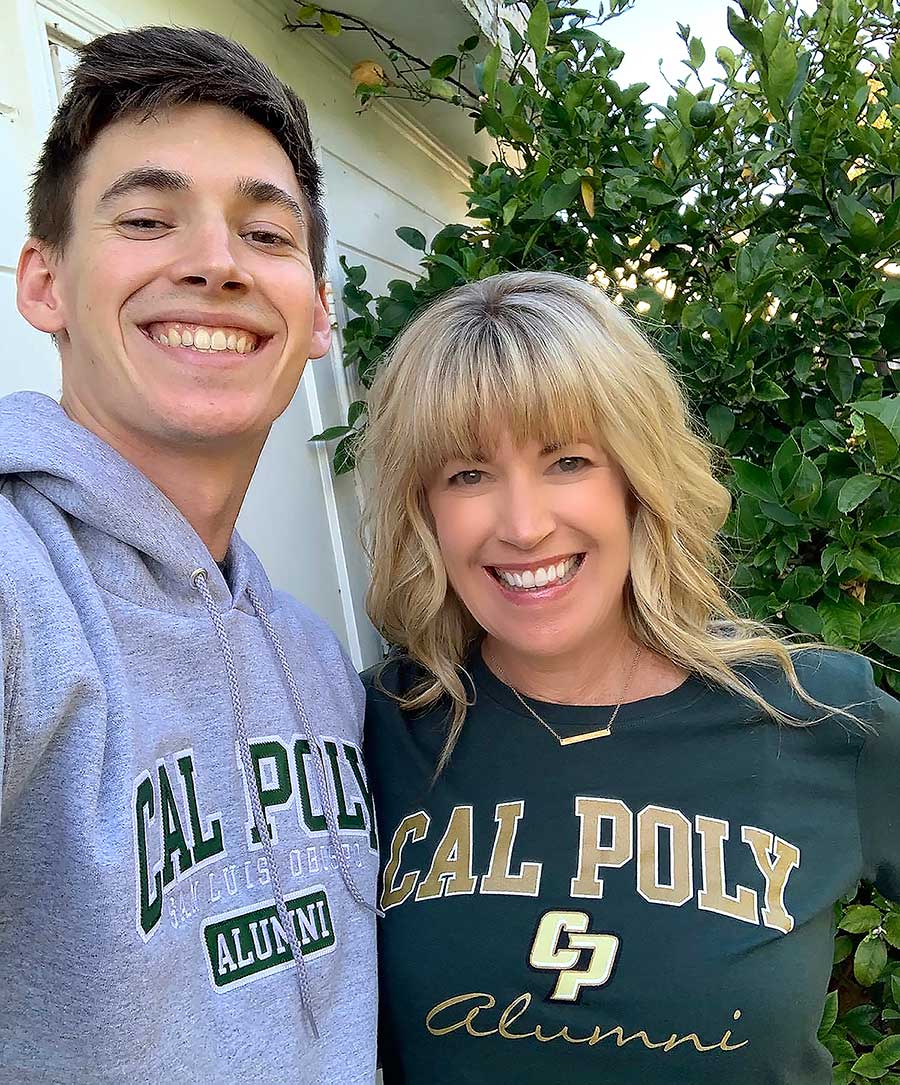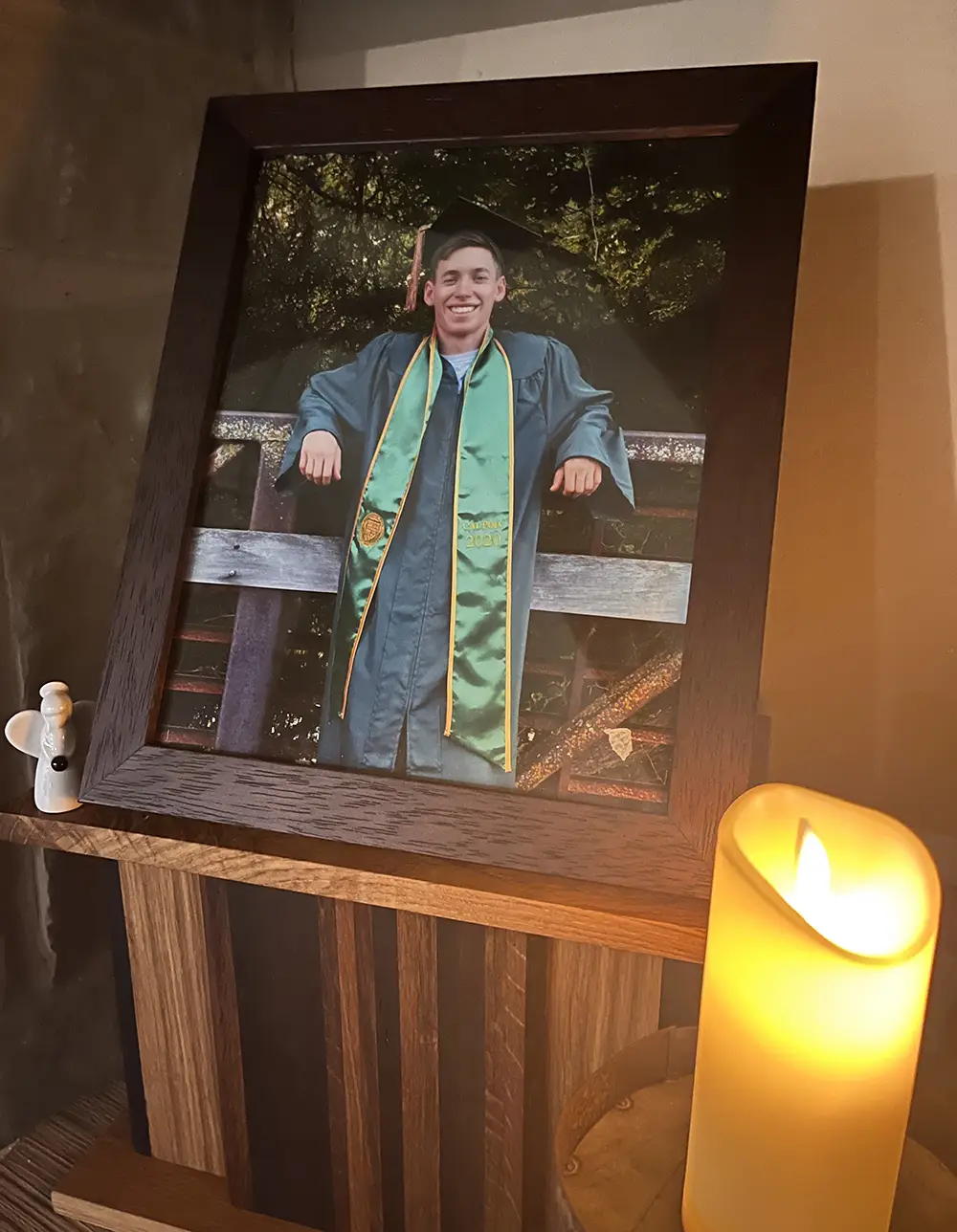 SCHOOL OF HEALTH PROFESSIONS
SCHOOL OF HEALTH PROFESSIONSLessons Worth Repeating
Traci Henegar values their feedback; and as an the mother of a former addict, finds their words inspiring. Her son, Davis, died in 2021 at the age of 24, from an accidental overdose. “No one would talk with us about (his addiction), not even the health care providers,” said Henegar, also a student in the Addicition Counseling program.
Learning the School of Medicine students annually go to the center, funded by donor support, Henegar proposed to expand the scope. Her family’s gift created an opportunity for an interdisciplinary group of students to attend training, a first in the Betty Ford Center’s history.
“This is one of the first grants we gave from our foundation,” Traci said. “So, we’re sort of learning as we go. But the responses alone exceed anything we could have possibly hoped for.”


DAVIS’ JOURNEY AND LEGACy
“Because of our experiences even before his death, we became passionate about supporting and advocating to eliminate the stigma associated with substance use disorder,” Henegar said. “And, also helping the health care professionals learn what needs to happen to help make those differences.”
Davis had almost four years of sobriety before his last relapse. During that time, he earned a degree from California Polytechnic State University, where he participated in the collegiate recovery program he helped launch. “He talked to all sorts of groups of incoming freshmen very honestly and openly about his journey and past. So, we never felt conflicted about the importance of keeping his purpose in life at the forefront and how he transformed his addiction experience into something positive. We felt it was really natural for us to want to grow that,” Henegar said.
Following their son’s death, Traci and Jim Henegar established a family foundation to honor Davis’ wishes and advocate for reducing the stigma of addiction.
When researching where to invest their gifts, Henegar said being a TTUHSC student made the university a natural fit. “I’d come to learn during my master’s program how little (exposure) most medical professionals get regarding addiction education. When I learned (from the development staff) about the Betty Ford Center program with the medical students, it was almost an immediate kind of visceral response for us about what a great opportunity that was for helping professionals to really see what it’s like, boots on the ground, when you are in a treatment program.”
THE BEGINNING OF THE BETTY FORD EXPERIENCE
In 2011, he and his wife, Mimi Bonds, established an endowment that sent the first TTUHSC medical students and faculty to the Betty Ford Center to learn how to better care for people with addictions through its Summer Medical Institute.
Read More about TTUHSC’s history with the Betty Ford Experience in the Summer 2011 issue of Pulse and on the TTUHSC Blog, Daily Dose.
Amber Wright, MD, (Resident ’14, Medicine ’11) an assistant professor in the School of Medicine Department of Pediatrics and a pediatric hospitalist, feels confident approaching her patients about their experiences with substance use due to her Betty Ford experience. She was in that first group of medical students — and returned with the medical student last fall as a faculty facilitator. “It was truly an eye-opening experience. That was a time when opioid addiction was a hot topic in medicine. I knew I didn’t understand why people could be addicted, and I knew that that wasn’t enough,” Wright recalls her first Betty Ford experience.
“I was really excited about going back to re-evaluate myself and where I’m at in my understanding of addiction, and then bring that back and share it with my students,” Wright said. “The biggest thing for patient care to me is humanizing people with addiction — and seeing the hope that people can overcome addiction has been huge as a provider.”
Wright’s experiences reflect the overall goal, said Simon Williams, PhD, senior associate dean for Academic Affairs in the School of Medicine, who oversees the Betty Ford Center student experience. “We’re trying to broaden people’s horizons
about the stigma around addiction and how to treat it as the chronic disease it is.
“That is one of the first things they teach at the Betty Ford Center. We don’t blame people for diabetes; we can’t blame them for addiction. As health care professionals, our job is to recognize the signs and provide them with the best method to overcome their addiction. Just like you can’t cure diabetes, you can’t cure addiction; but there are options to help them manage the disease.”

A GOOD START – BUT NOT A PLACE TO STOP
“In medical school, we scratch the surface regarding addiction counseling because there are so many subjects we have to cover,” Williams said. “Of course, you may see signs of substance use disorders within each of our clerkships. So, we’re trying to put together a very longitudinal program, which will start with learning the basics of pharmacology and communication skills around substance use disorders and then expand that to have people who graduate with much better education and addiction medicine.
And the opportunities for interdisciplinary learning are just phenomenal, he added. “From addiction counseling where substance use disorders and unhealthy dependencies are the focus, to pharmacy’s study of drugs.”
Jennifer Ozawa, a student in the psychiatric mental health nurse practitioner program, returned from the Betty Ford Center with a support team with whom she now has a shared experience, but even better, who represents a network beyond her area of expertise with whom she can collaborate well into the future — professionals such as Taylor Scroggins, a pharmacy student, and Jennifer Carlson, a public student.


School of Health Professions
“In medical school, we scratch the surface regarding addiction counseling because there are so many subjects we have to cover,” Williams said. “Of course, you may see signs of substance use disorders within each of our clerkships. So, we’re trying to put together a very longitudinal program, which will start with learning the basics of pharmacology and communication skills around substance use disorders and then expand that to have people who graduate with much better education and addiction medicine.
You get into school, and you get tunnel vision. This took me back. You got both sides of this with the immersion and humanity parts, but also, our education was so well done. It re-ignited that passion of why I was doing this.
WHERE WE GO FROM HERE
“We have a lot of pieces of this (addiction education) in our curriculum, but it’s not as well structured as it could be. And so, this is a springboard for us to grow,” said LaMicha Hogan, PhD, APRN, FNP-BC, associate dean in the School of Nursing and Department Chair for APRN Programs, who attend with the interdisciplinary group this spring as a faculty advisor.
This fall, The School of Medicine will offer a peer-taught elective focusing on dispelling the stigma of addictions so that more medical students can learn more in-depth early on.
“I would love this institution to be known as a place where identifying and treating addictions is a skill that all of our graduates at least are exposed to,” said Williams.
Hearing these opportunities growing out of the Betty Ford experience, Henegar said, “somewhat redeems” their journey with Davis and his addiction. “His life and so many others have continued purpose and a legacy through these experiences and the changes that come about as a result.”